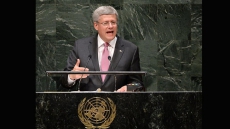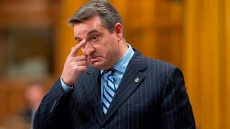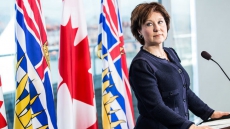UNITED NATIONS, United States - The Conservative government is promising that the House of Commons would vote on a combat mission in northern Iraq as questions swirled about whether Canada was asked to take part or had made some of the advances.
Foreign Affairs Minister John Baird said Thursday that cabinet would consider an expanded military role and that it would come before the House.
"If there's a combat mission, I think the prime minister has always been very clear, that would go before Parliament for a vote, that has not changed," Baird told reporters at the United Nations on Thursday, shortly before Stephen Harper spoke to the assembly.
Baird said air strikes, a contribution that Canada could most quickly deploy, would amount to a combat mission.
”That was the same situation in Libya, so there’s no new policy here,” said Baird, referring to the use of CF-18 fighter jets to enforce a no-fly zone over Libyan skies in that country's civil wars.
The question of whether Canada or the U.S. made the first move remained unclear after statements about a possible escalation of Canada's efforts in Iraq emerged from both governments.
Additional information emerged Thursday, a day after Harper declared that he'd received an offer from the U.S. government, and was considering it.
Global News reported a few more details under the eye-grabbing headline: "U.S. says Canada offered to help in Iraq – not the other way around."
The opposition jumped on the story, insinuating that the prime minister had been less than truthful about who approached who.
"The Prime Minister should not be playing coy political strategy games and fudging the truth when the lives of our soldiers are on the line. It is unacceptable," Liberal leader Justin Trudeau said in a statement late Thursday night.
“Any change to Canada’s non-combat mission in Iraq must only be made with rigorous and effective Parliamentary oversight."
The PMO's explanation? Old news.
"We have said, 'If there is more that Canada can do, we will listen to those requests,'" said Harper spokesman Jason MacDonald.
"It was in response to those conversations that we received a letter."
When asked whether he was annoyed about the statement emanating from the U.S. military, just before Harper's speech to the United Nations General Assembly, MacDonald responded emphatically in the negative: "I don't think there was any ill-intent at all. They (at the Pentagon) were asked a question and they answered."
The U.S. government did not directly answer the question on whether Canada approached the U.S.
"What I can tell you," said an email Thursday from U.S. defence spokeswoman Cmdr. Elissa Smith, "is that the Canadians requested additional details on what they could do to contribute to coalition efforts to aid the Government of Iraq in countering ISIL and (the Department of Defence) sent a letter describing areas where their contributions would be helpful."
Baird said cabinet would consider whether to expand Canada's military role beyond the decision to send 69 military advisers to Iraq.
"Canadians would expect us as a government to look at the (U.S.) request, to get counsel and advice from the chief of defence staff and others before we make a decision," Baird said.





